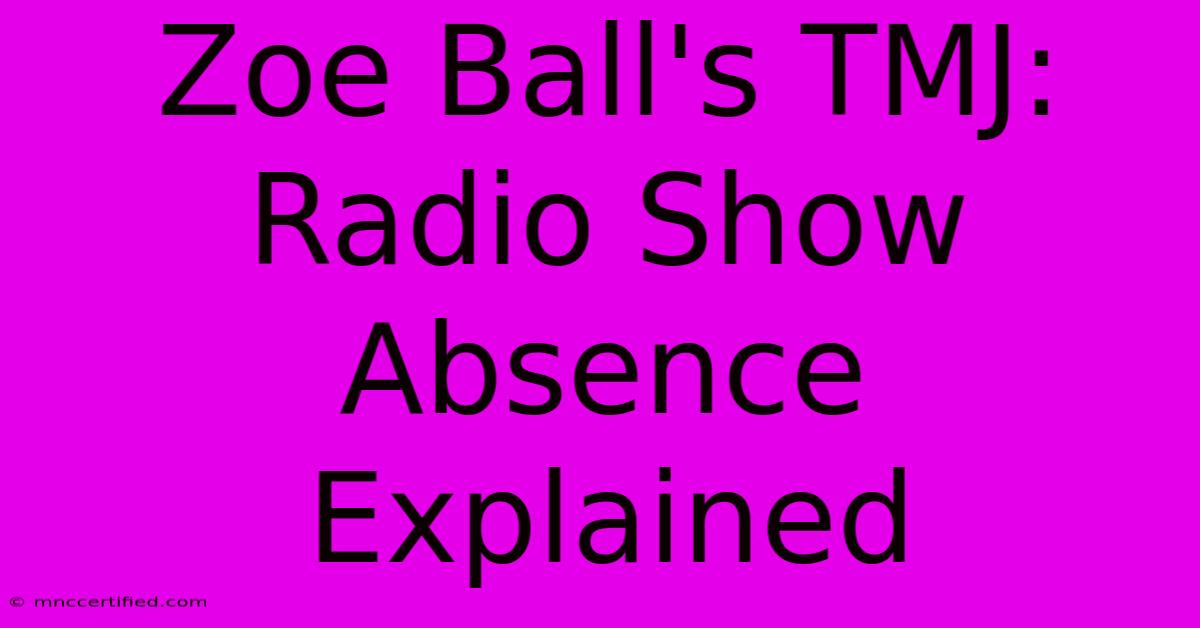Zoe Ball's TMJ: Radio Show Absence Explained

Table of Contents
Zoe Ball's TMJ: Radio Show Absence Explained
Popular BBC Radio 2 presenter Zoe Ball recently took a break from her show, leaving fans wondering about her whereabouts. The reason? Temporomandibular joint (TMJ) disorder. This article delves into the specifics of TMJ, its impact on daily life, and why it caused Zoe Ball's temporary absence from her beloved radio program.
Understanding Temporomandibular Joint (TMJ) Disorder
TMJ disorder, or temporomandibular joint dysfunction (TMD), affects the jaw joint, connecting your jawbone to your skull. This joint is crucial for speaking, chewing, and yawning. When this joint becomes inflamed or misaligned, it can lead to a range of painful and debilitating symptoms.
Common TMJ Symptoms:
- Jaw pain: This can range from mild aches to severe, debilitating pain.
- Headaches: TMJ disorders are often associated with tension headaches and migraines.
- Earaches: Pain in the ear, often mistaken for an ear infection.
- Neck pain: The pain can radiate into the neck and shoulders.
- Clicking or popping in the jaw: A noticeable sound when opening or closing the mouth.
- Difficulty opening or closing the mouth: Limited jaw range of motion.
- Facial pain: Pain in the face, often around the jaw and temples.
Zoe Ball's Absence from Radio 2: The TMJ Connection
While Zoe Ball hasn't explicitly detailed the severity of her TMJ, her absence from her radio show strongly suggests a significant impact on her ability to perform her duties. Presenting a radio show requires clear speech and articulation, and TMJ pain can severely interfere with these functions. The pain itself, coupled with potential medication side effects, could have also made broadcasting challenging.
The Importance of Rest and Recovery:
Taking time off work is crucial for anyone suffering from TMJ. The condition often requires a multi-faceted approach to management, including rest, physical therapy, medication, and possibly even surgery in severe cases. Zoe Ball's decision to prioritize her health underscores the importance of listening to your body and seeking appropriate medical attention.
TMJ Treatment Options:
The treatment for TMJ depends on the severity of the condition and the individual's specific symptoms. Some common treatment options include:
- Pain relievers: Over-the-counter pain relievers like ibuprofen or naproxen can provide temporary relief.
- Muscle relaxants: These can help reduce muscle spasms and pain associated with TMJ.
- Physical therapy: Exercises and stretches can help improve jaw mobility and reduce pain.
- Splints or mouthguards: These devices can help reposition the jaw and reduce strain on the joint.
- Injections: Corticosteroid injections can reduce inflammation in the joint.
- Surgery: In severe cases, surgery may be necessary to correct structural problems in the jaw joint.
Returning to the Airwaves: A Positive Outlook
While Zoe Ball's absence from Radio 2 was undoubtedly disappointing for her listeners, it highlights the importance of prioritizing mental and physical health. We can expect her return to broadcasting once she has fully recovered and is comfortable doing so. Her decision to take time off reflects a responsible approach to managing a potentially debilitating condition. The support from her fans and colleagues undoubtedly contributes to a positive outlook for her recovery.
SEO Keywords Used:
- Zoe Ball
- TMJ
- Temporomandibular joint disorder
- TMD
- Radio 2
- BBC Radio 2
- Jaw pain
- Headache
- Earache
- Neck pain
- Radio show absence
- Treatment options
- TMJ treatment
Note: This article provides general information about TMJ and should not be considered medical advice. If you are experiencing symptoms of TMJ, it's crucial to consult a healthcare professional for proper diagnosis and treatment.

Thank you for visiting our website wich cover about Zoe Ball's TMJ: Radio Show Absence Explained. We hope the information provided has been useful to you. Feel free to contact us if you have any questions or need further assistance. See you next time and dont miss to bookmark.
Featured Posts
-
Gowrie Group Marine Insurance
Nov 29, 2024
-
Middleton William Honor Queen Liz
Nov 29, 2024
-
Insurance Adjuster Lied To Me
Nov 29, 2024
-
Soules Insurance Conroe Texas
Nov 29, 2024
-
Suing A Car Insurance Company
Nov 29, 2024